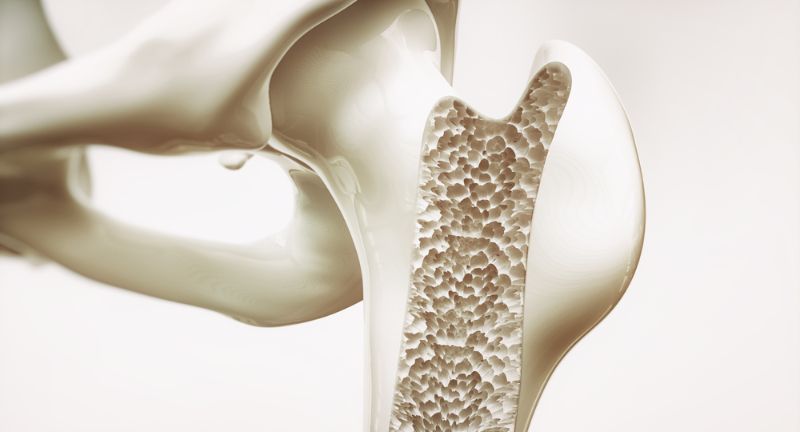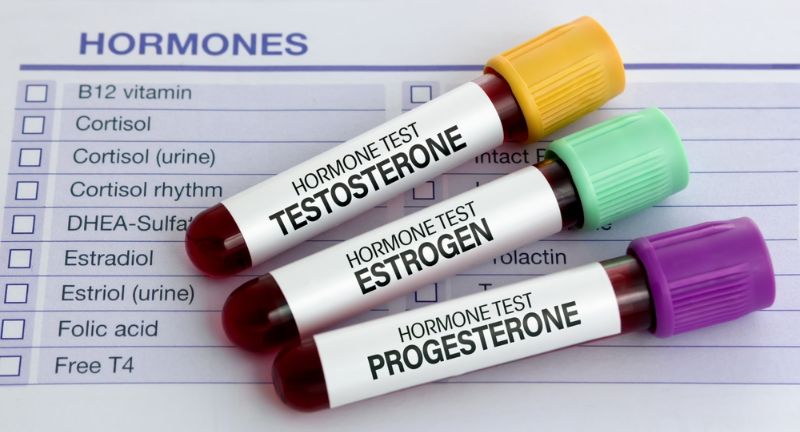
Shutterstock
Osteoporosis is a major health issue impacting millions globally, marked by fragile bones and a heightened risk of fractures. Often, this condition advances quietly until a fracture happens, highlighting the importance of early prevention. Lifestyle and diet are key factors in preserving bone health and preventing osteoporosis. Here are some holistic strategies, including nutritional modifications and lifestyle alterations, to strengthen bone density and resilience. Embracing these preventive actions can greatly improve bone health and lower the chances of developing osteoporosis.
Maintain a Healthy Weight

Shutterstock
Being underweight can raise the chances of bone loss and fractures, particularly in postmenopausal women. Keeping a healthy weight supports bone structure and strength. Effective weight management involves a balanced diet and regular physical activity. It is advisable to seek personalized guidance on weight and bone health from a healthcare provider.
Avoid Smoking

Shutterstock
Smoking negatively impacts bone health, speeding up bone loss and raising the chances of fractures. The substances in cigarettes harm bone cells and hinder the body’s calcium absorption. Stopping smoking can significantly enhance bone density over time. Those who smoke should get assistance to quit as a crucial step in preventing osteoporosis.
Incorporate Magnesium and Potassium-Rich Foods for Bone Health

Shutterstock
Magnesium and potassium play a crucial role in maintaining bone health by aiding in calcium absorption. Foods such as nuts, whole grains, and leafy green vegetables are excellent sources of magnesium, while bananas, oranges, and potatoes provide ample amounts of potassium. Including these foods in your diet can help preserve bone density. A balanced intake of these minerals not only supports overall bone health but also helps prevent bone-related diseases.
Importance of Vitamin D for Bone Health

Shutterstock
Vitamin D plays a crucial role in maintaining bone health by aiding the absorption of calcium. While natural sunlight is an excellent source of vitamin D, supplements may be needed in areas with limited sunlight. Additionally, consuming foods such as fatty fish, liver, and fortified milk can help boost your vitamin D levels. Ensuring regular intake of vitamin D is vital for optimal bone health and can help prevent conditions like osteoporosis.
The Risks of Excessive Vitamin A Intake

Shutterstock
Consuming high amounts of vitamin A, especially from supplements, poses risks to bone health. Balancing vitamin A intake is crucial, with particular attention to retinol, as too much can cause bones to thin. Liver and fortified foods are rich sources of vitamin A. Maintaining a balanced diet with diverse food sources can help keep vitamin A levels under control.
Limit Caffeine

Shutterstock
Caffeine can disrupt calcium absorption and, when consumed excessively, might lead to bone density reduction. Keeping caffeine intake to 2-3 cups of coffee daily is usually deemed safe for maintaining bone health. Additionally, be mindful of caffeine in tea, soft drinks, and chocolate. Moderating caffeine consumption is a precautionary step against osteoporosis.
Benefits of Omega-3 Fatty Acids for Bone Health

Shutterstock
Omega-3 fatty acids are considered beneficial in reducing bone loss and improving bone strength. They are abundantly present in fatty fish like salmon, mackerel, and sardines. Additionally, plant-based sources such as flaxseeds and walnuts also provide a good amount of omega-3s. Including these omega-3 rich foods in your diet can be an effective strategy for preventing bone density loss.
Monitor Protein Intake

Shutterstock
Protein is a crucial nutrient for maintaining bone health. However, consuming too much protein can result in calcium loss. It’s important to ensure that your diet includes sufficient but not excessive amounts of protein. Lean meats, dairy products, and legumes are excellent sources that can help strengthen bones. Balancing protein intake with other essential nutrients is key to promoting overall bone health.
Consume a Variety of Vegetables for Optimal Bone Health

Shutterstock
Vegetables are packed with essential nutrients that promote bone health, such as vitamin C, magnesium, and potassium. Consistently eating a wide range of vegetables, particularly green and leafy ones, supports the maintenance of bone density. Additionally, vegetables offer dietary fiber, which is crucial for general well-being. Including a diverse mix of vegetables in your diet is fundamental for sustaining bone health and preventing osteoporosis.
Moderate Alcohol Consumption

Shutterstock
Consuming too much alcohol can cause bone deterioration and elevate the risk of fractures. Alcohol disrupts calcium balance and the creation of bone-building hormones. To maintain overall bone health, it is crucial to restrict alcohol to moderate levels—generally up to one drink per day for women and two drinks per day for men.
The Importance of Staying Active

Shutterstock
Leading an active lifestyle enhances overall wellness and strongly influences bone health. Engaging in physical activities promotes bone growth and preservation. A mix of exercises such as aerobic routines, flexibility workouts, and resistance training offers extensive advantages. Maintaining an active routine is essential for preventing osteoporosis and ensuring a healthy life.
Boost Your Calcium Consumption

Shutterstock
Ensuring adequate calcium intake is essential for maintaining bone strength and density. To achieve this, it is advisable to include a variety of calcium-rich foods in your diet, such as dairy products, leafy greens, and fortified cereals. For those who find it challenging to meet their calcium needs through diet alone, supplements can be an option, but it is important to seek advice from a healthcare provider first. Maintaining the recommended levels of calcium is crucial for keeping your bones healthy and preventing osteoporosis.
Ensure Adequate Vitamin K Intake for Bone Health

Shutterstock
Vitamin K is essential for bone health as it assists in the production of proteins necessary for bone formation. Excellent sources of vitamin K include green leafy vegetables such as kale, spinach, and broccoli. A deficiency in vitamin K may result in weaker bones and a higher risk of fractures. Therefore, maintaining sufficient vitamin K intake is crucial for preserving strong bones.
Importance of Routine Bone Density Screenings

Shutterstock
Routine bone density screenings are crucial for monitoring bone health and identifying early indicators of osteoporosis. These tests hold significant importance for high-risk groups, including older adults and postmenopausal women. Early identification facilitates timely intervention and appropriate treatment measures. Consulting with a healthcare professional is recommended to determine the suitable frequency of these screenings based on individual risk factors.
Enhance Your Knowledge on Bone Health

Shutterstock
Being informed about bone health is essential for the effective prevention of osteoporosis. Keeping up with the latest research and guidelines can assist you in adjusting your lifestyle to better support your bones. Valuable educational resources include books, trustworthy websites, and health seminars. By understanding the factors impacting bone health, you can make educated decisions regarding diet, exercise, and lifestyle.
Manage Hormones

Shutterstock
Hormonal balance is crucial in preserving bone density, particularly the role of estrogen in women after menopause. To manage hormone levels and prevent swift bone loss, Hormone Replacement Therapy (HRT) might be an option under medical supervision. It’s essential to talk about the possible advantages and risks of HRT with your healthcare provider. Effectively managing hormone levels can play a vital role in preventing osteoporosis.
Benefits of Regular Physical Exercise

Shutterstock
Participating in consistent physical exercise, particularly weight-bearing activities like walking and jogging, contributes to the development and retention of bone density. Incorporating strength training exercises, such as lifting weights or using resistance bands, can also fortify bones. Additionally, activities that enhance balance and flexibility, such as yoga and tai chi, can help lower the risk of falls and associated fractures. Integrating physical exercise into your daily routine is essential for maintaining healthy and robust bones.
Minimize Sodium Consumption

Shutterstock
Excessive sodium intake can lead to increased calcium loss via the kidneys, which can detrimentally impact bone density. By reducing sodium in your diet, you can help preserve calcium and support stronger bones. It is recommended to cut down on processed and fast foods, as they are commonly high in sodium. Monitoring your sodium intake is a practical approach to ward off osteoporosis.
Maintaining Nutritional Balance for Health

Shutterstock
Achieving a well-rounded diet is crucial for supplying the essential nutrients that promote bone health and general wellness. Your diet should comprise a variety of macro and micronutrients to aid in different bodily functions. Regularly incorporating foods high in calcium, vitamin D, magnesium, and other vital nutrients into your meals is key. This nutritional balance plays a significant role in the prevention of osteoporosis.
Assess Your Medications for Bone Health

Shutterstock
Certain medications, especially prolonged use of corticosteroids, can negatively impact bone density. It is essential to discuss your medication regimen with your doctor to pinpoint any potential threats to your bone health. Whenever possible, consider alternative treatments that pose less risk to bone density. Ongoing medical consultations are key to managing your medications and reducing their harmful effects on bone health.
Conclusion

Shutterstock
Preventing osteoporosis requires a comprehensive approach that includes proper diet, regular exercise, and lifestyle changes. By integrating these practices into your daily life, you can enhance bone health and lower the risk of developing osteoporosis. Starting these habits early is crucial to build and maintain strong bones throughout your life. Regular check-ups with healthcare professionals can help customize these strategies according to your individual health needs. Taking proactive measures for bone health can enable you to enjoy a healthier, more active life without the limitations of osteoporosis.














































